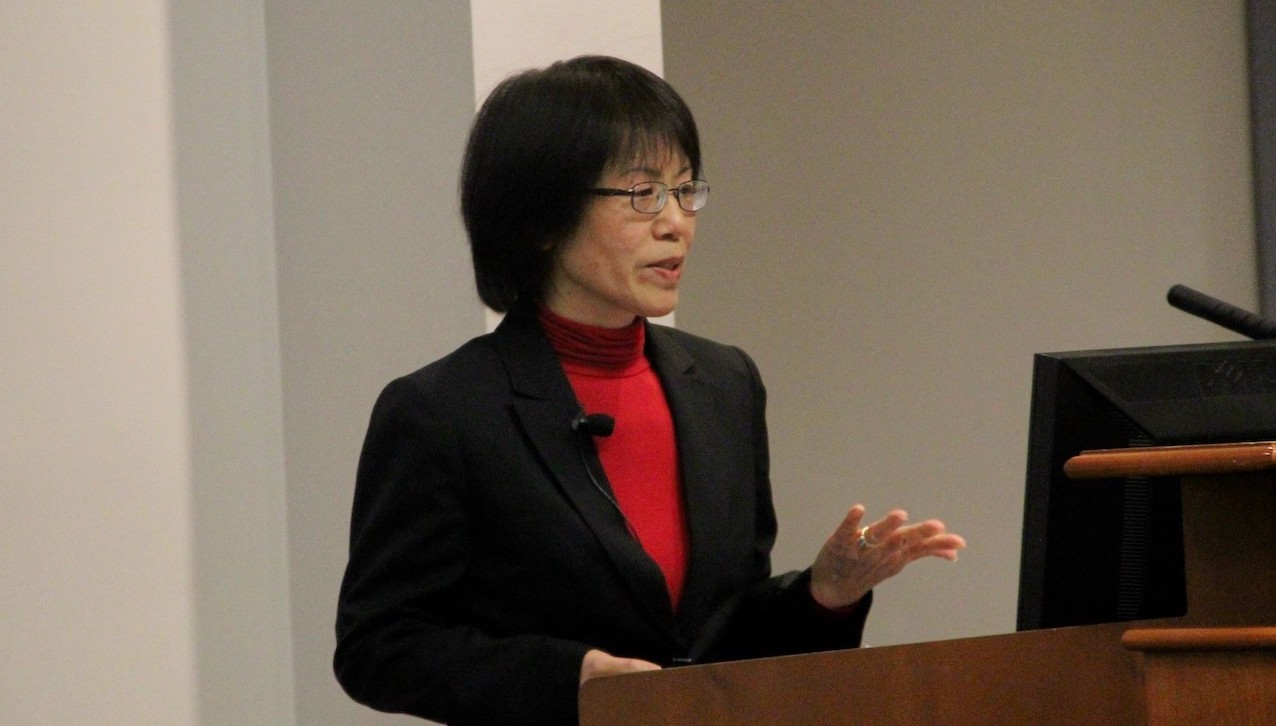Lecture Series Focuses on Women in Asia

The University of Scranton Asian Studies Program began a three-part spring lecture series exploring Women in Asia with presentations by Shuhua Fan, Ph.D., professor of history, and Ann Pang-White, Ph.D., professor of philosophy and director of Asian Studies. The professors discussed the historical and philosophical portrayal of women in mainland China and Taiwan, with a focus on inequality and obstacles faced by Chinese women and the possible means of redemption offered through Buddhism, Confucianism and Daoism.
In her presentation “Women in Mainland China and Taiwan,” Dr. Fan said “to Confucius, family was very important because family was the basic unit of society and also for the practice of marriage. In Chinese culture, before the 1980s, single-life was abnormal, except for widows, monks and nuns, so everyone had to be married.”
Dr. Fan also discussed the role of a concubine, a woman who lives with a man in a household but has a lower societal status than his wife or wives. A concubine was seen to fulfill the man’s sexual desires and bear children.
“Concubines mainly functioned as a symbol of power and wealth, because families needed to have sons,” Dr. Fan said, who noted that having a son was seen as much more valuable than having a daughter at the time. The people of power ranged from military leaders to political leaders in China.
“Most of the concubines were from poorer families because they could not afford to give them a good marriage,” Dr. Fan said. “Many were purchased from tea houses, suitors or brothels.”
It wasn’t until 1971 that a ban on concubines began with the Marriage Reform Ordinance in Hong Kong. Since the 1980s, however, Dr. Fan said there has been resurgence of concubine culture in China with the trend of wealthy business men having mistresses.
“The central government, the provisional government and private organizations have launched campaigns on anti-mistress and anti-corruption,” Dr. Fan said.
Following Dr. Fan’s remarks, Dr. Pang-White presented “Beyond Gender: Buddhism and Women in Contemporary Taiwan.”
Dr. Pang-White began her lecture with a poem on Buddhism and how gender is not a factor when someone ascends to enlightenment.
“An enlightened being is both male, female and man, women because they are not tied to a gender,” Dr. Pang-White said. “It does not matter which final form this enlightened being is, when he or she ascends to Buddhahood.”
Even though there is no gender discrimination when trying to achieve enlightenment through worship, Dr. Pang-White said “early text originally only allows men to become monks. Women were not allowed to go outside of the household to become nuns.”
Dr. Pang-White said that women were eventually allowed to form their own nunnery, not to be governed by men. There were still rules, the “8 Heavy Rules,” that nuns have to follow.
“It is forbidden for a nun to accuse a monk of a transgression, but monks can admonish nuns for their transgressions,” Dr. Pang-White said. “It’s not equitable.”
This discrimination started to dissipate with a folklore tale from the book “Lotus Sutra.” In the book, the Dragon King’s Daughter sought to achieve enlightenment from the Buddha. She was rejected at first for not being a man then became enlightened after offering a pearl to the Buddha.
“This is a daughter not a son, an 8-year-old daughter attaining Buddhahood not an 8-year-old prince. It reverses the paradigm,” Dr. Pang-White said. “This really opened the gate for female Buddhas in tradition it became a hugely popular concept in Japan, China and Taiwan.”
In 1949 when the communist party took power in China, Buddhist monks fled to Taiwan and were in need of students, so they took female students.
“They integrated women’s status as legitimate students in Buddhism,” said Dr. Pang-White.
Women in Buddhism continued to grow until the point where women were allowed to own their own monasteries and work with the male monks in Taiwan.
“We see now that Buddhist nuns take leadership roles in providing alternative venues for women who don’t want to get married – that want spiritual progress and not to be bound by household duties,” Dr. Pang-White said. “They want to seek more education.”







